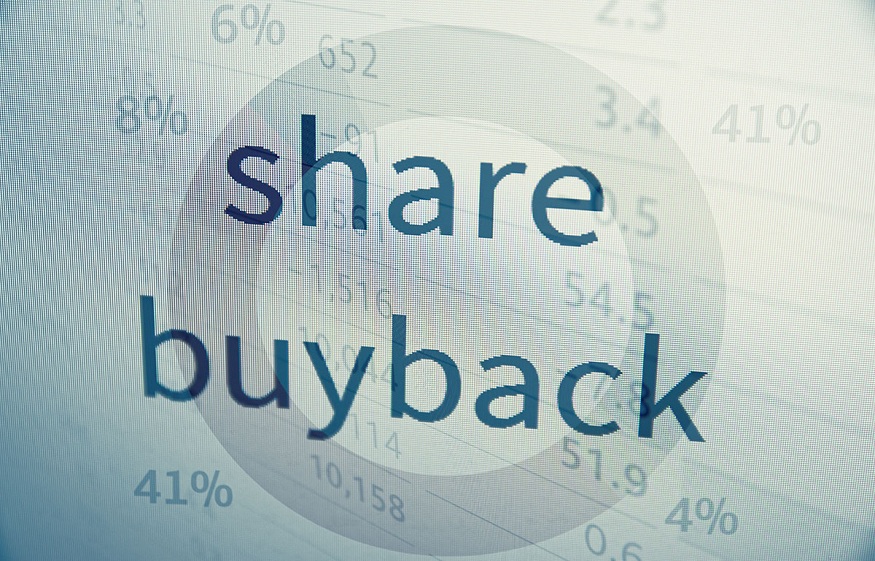
Over the last several years, there has been debate on whether a share buyback or share repurchase is good for both firms and investors. While part of the advice was correct, most of it appears to have been misspoken owing to a lack of knowledge regarding the share buyback. Financial markets praised companies for utilizing share repurchase as a strategic tool to improve operational performance. Let’s understand what is share buyback.
What is share buyback?
When a firm buys back shares from existing owners, this is known as a share buyback or repurchase. A share repurchase or buyback transaction involves two mutually interested parties: a shareholder and the corporation. After purchasing the shares from the stockholders, the firm has complete control of its operations. As a result, the corporation is protected from aggressive takeovers or underpriced purchases. Share buyback or repurchase also establishes the stock options facility for its workers, allowing them to acquire them at a discount or set price.
Unlike dividend programs, share buyback programs are simple to implement and implement in the market. Furthermore, share buyback is a method of returning funds to shareholders. Once the share buyback agreement between the corporation and the shareholder is performed, the shares are removed from the market.
Reasons for Share Repurchase
There are several causes for the share repurchase program. Here are a few examples:
- If the corporation discovers that its shares have a reasonable value in the coming days, it will repurchase them when they are cheap.
- Another explanation might be the dilution of the company’s shares due to the further issuance of shares to the public to bring in more money.
- Sometimes a corporation seeks to rearrange its financial ratios and increase its capital. As a result of share repurchases or buybacks, the number of outstanding shares in the market decreases, increasing the entity’s EPS and ROE values.
- The corporation conducts share repurchases to consolidate ownership.
- When the market is down, share repurchases assist in improving stock value, so comforting investors. This strategy is also used to attract new investors for extra funding.
- The corporation can keep other rivals from acquiring their ownership. In certain ways, the share repurchase can deter inexpensive mergers and acquisitions.
- Share buyback allows the corporation to acquire cheap shares from shareholders at a fixed price, inject demand into the market, and then sell them at a higher price. As a result, the firm will profit more in the market.
Advantages of Share Repurchase
As the proverb goes, “every coin has two sides,” and share buyback offers both advantages and disadvantages. Before investing in any firm, you should be aware of the following:
- Companies that are not in the major leagues use share repurchase schemes to increase the market value of their stock. This helps firms gain the attention of new investors, causing them to invest.
- Shareholders are not required to participate in the share buyback agreement. There are no policies in place that require shareholders to present their shares at the corporation’s request.
- Companies utilize the share repurchase technique when their stock is trading at a low price in the market. This increases market demand, resulting in the shares trading at a higher price after the repurchase.
- Share repurchases benefit the firm during a recession or a market correction. It raises the share price worth of firms with lower gains and debt ratios than the industry average.
- The stockholders gain from a tax break on the share buyback. If the corporation has additional cash on hand or in the bank, it will either pay dividends or repurchase shares. Dividend tax is calculated using income tax slab rates, whereas share buyback tax is calculated using capital gain tax. As a result, if the shareholders choose share buyback, they will be in a reduced tax rate.
Disadvantages of Share Repurchase
- Although businesses have complete control over their operations, errors are possible. The share repurchase program would be terrible if the prospects were either overstated or underestimated.
- The share repurchase may unethically induce the company’s higher authorities to increase their stake in the firm.
- The share repurchase program can manage the market price of shares.
- While most believe that share repurchase is a positive move, the rise in other metrics like ROE, EPS, and a few other ratios is inorganic. Because of the profitability outcome induced by the share repurchase, these ratios show realistic outcomes.
- Businesses undertake large projects. The distribution of available cash to shareholders through share repurchases would halt major investment decisions. This might endanger the company’s image and could scrap the agreement.
Two major stock exchanges in India account for the majority of trading volume in the equity share market. The Bombay Stock Exchange is abbreviated as BSE, and the National Stock Exchange is abbreviated as NSE. These are two of India’s major stock markets and among the largest in Asia, trailing only Japan, China, and Hong Kong.
Whether you are an investor or a trader, you must grasp what these stock exchanges are and what is the difference between BSE and NSE.
What is the difference between BSE and NSE?
NSE is an abbreviation for the National Stock Exchange, and BSE is an abbreviation for the Bombay Stock Exchange. The NSE is India’s largest stock market, whereas the BSE is Asia’s oldest. The volumes traded on the NSE are far greater than those exchanged on the BSE.
To conclude,
A share buyback is an excellent approach businesses use to gain control of their operations. The program has several differences and techniques for dealing with the procedure. Every share buyback program is carried out separately. No approach imposes any responsibility or onus on owners to return their shares for a specified price.
However, the USP is that they retain ownership and power rather than allowing freeloaders to take over the firm. It is up to the shareholders to decide whether to proceed or not with the sale of shares back to the corporation. In terms of tax benefits, share repurchases have an advantage over dividends.



